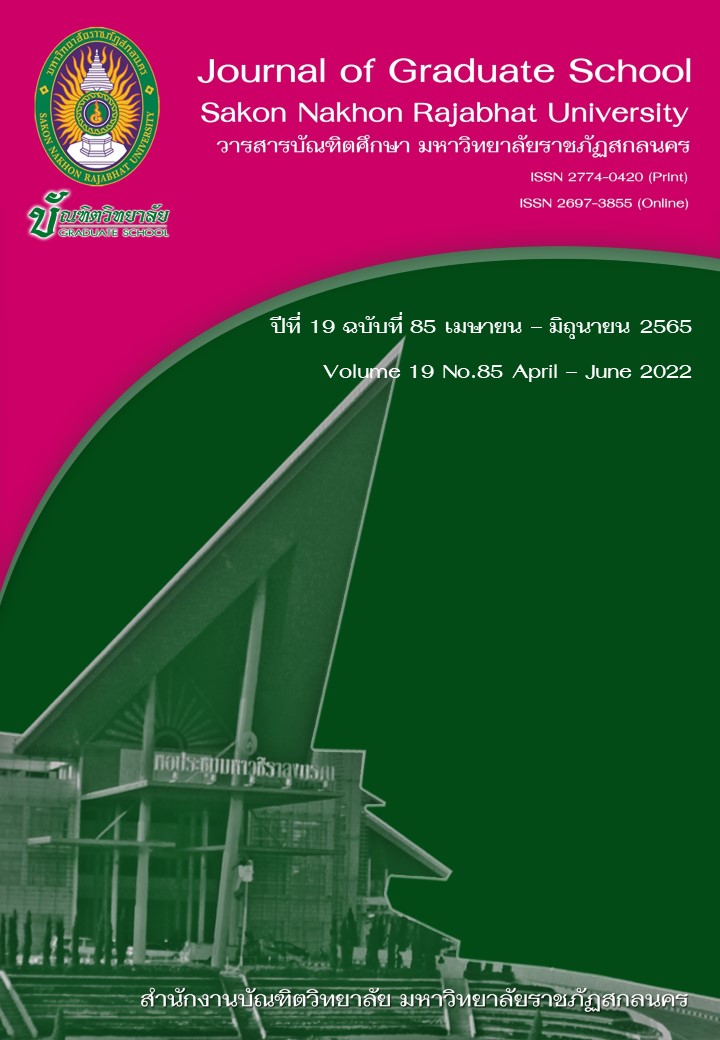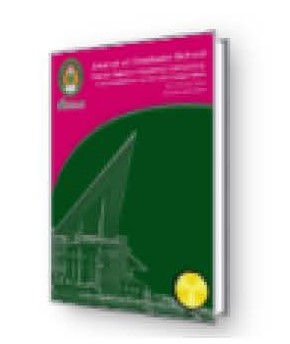การจัดการเรียนรู้แบบโครงงานที่เน้นสัมมาอาชีพของครู โรงเรียนพระปริยัติธรรม วัดป่าตาลใต้ จังหวัดเชียงราย
คำสำคัญ:
ทักษะสัมมาอาชีพ, การจัดการเรียนรู้แบบโครงงาน, โรงเรียนพระปริยัติธรรมบทคัดย่อ
การวิจัยครั้งนี้มีวัตถุประสงค์เพื่อ 1) พัฒนาการจัดการเรียนรู้แบบโครงงานที่เน้นสัมมาอาชีพของครูโรงเรียนพระปริยัติธรรม วัดป่าตาลใต้ 2) ศึกษาปัญหาการจัดการเรียนรู้แบบโครงงานที่เน้นสัมมาอาชีพของครู โรงเรียนพระปริยัติธรรม วัดป่าตาลใต้ กลุ่มตัวอย่างในการวิจัย ได้แก่ ครู จำนวน 12 คน สามเณรนักเรียน จำนวน 118 คน รวมทั้งสิ้น 130 คน จากโรงเรียนพระปริยัติธรรม วัดป่าตาลใต้ จังหวัดเชียงราย การวิจัยแบ่งเป็น 2 ขั้นตอน โดยขั้นตอนที่ 1 การพัฒนาทักษะการจัดการเรียนรู้แบบโครงงานที่เน้น สัมมาอาชีพของครู และ ขั้นตอนที่ 2 การศึกษาปัญหาการจัดการเรียนรู้แบบโครงงานที่เน้นสัมมาอาชีพของครู เครื่องมือวิจัย ได้แก่ 1) แบบประเมินแผนการจัดการเรียนรู้ของครู 2) แบบประเมินทักษะการจัดการเรียนรู้ของครู 3) แบบประเมินทักษะการปฏิบัติโครงงานของสามเณรนักเรียน 4) แบบสอบถามความพึงพอใจต่อกิจกรรมการเรียนรู้ของสามเณรนักเรียน และ 5) แบบสัมภาษณ์ปัญหาการจัดการเรียนรู้แบบโครงงานที่เน้นทักษะสัมมาอาชีพของครูโรงเรียนพระปริยัติธรรม วัดป่าตาลใต้ วิเคราะห์ข้อมูลเชิงปริมาณโดยใช้ค่าเฉลี่ยและส่วนเบี่ยงเบนมาตรฐาน และวิเคราะห์ข้อมูลเชิงคุณภาพโดยใช้การวิเคราะห์เนื้อหา (Content analysis) ผลการวิจัย พบว่า 1. ผลการพัฒนาการจัดการเรียนรู้แบบโครงงานที่เน้นสัมมาอาชีพของครูโรงเรียนพระปริยัติธรรม วัดป่าตาลใต้ 1.1 ครูสามารถสร้างแผนการจัดการเรียนรู้โครงงานที่เน้นสัมมาอาชีพได้ และผลการประเมินแผนการจัดการเรียนรู้อยู่ในระดับมาก 1.2 ครูมีทักษะการจัดการเรียนรู้โครงงานที่เน้นสัมมาอาชีพหลังเข้ารับการพัฒนาสูงกว่าก่อนการพัฒนาอย่างมีนัยสำคัญทางสถิติที่ระดับ .05 1.3 สามเณรนักเรียนมีทักษะการทำโครงงานที่เน้นสัมมาอาชีพอยู่ในระดับมาก 1.4 สามเณรนักเรียนมีความพึงพอใจต่อกิจกรรมการเรียนรู้แบบโครงงานที่เน้นทักษะสัมมาอาชีพในภาพรวมอยู่ในระดับมาก 2. ผลการศึกษาปัญหาการจัดการเรียนรู้แบบโครงงานที่เน้นสัมมาอาชีพของครูที่สำคัญ 3 ลำดับแรกเป็น ดังนี้ 1) สามเณรนักเรียนขาดความคิดสร้างสรรค์และแรงจูงใจในการทำโครงงาน 2) สามเณรนักเรียนไม่สามารถเชื่อมโยงการจัดทำโครงงานกับความเป็นสัมมาอาชีพจากแหล่งเรียนรู้ได้ และ 3) ครูมีทักษะด้านดิจิทัลที่จะสนับสนุนการจัดทำโครงงานไม่เพียงพอ
เอกสารอ้างอิง
กองพุทธศาสนศึกษา สำนักงานพระพุทธศาสนาแห่งชาติ. (2557). คู่มือปฏิบัติงาน โรงเรียนพระปริยัติธรรม แผนสามัญศึกษา. กรุงเทพฯ: โรงพิมพ์สำนักงานพระพุทธศาสนาแห่งชาติ.
กรมการพัฒนาชุมชน กระทรวงมหาดไทย. (2562). แนวทางการสร้างสัมมาชีพชุมชน ปี 2562. กรุงเทพฯ: สำนักเสริมสร้างความเข้มแข็งชุมชน กรมการพัฒนาชุมชน.
ชมพู อิสริยาวัฒน์ และธิดารัตน์ คีมกระโทก. (2561). พัฒนาสัมมาชีพตามวิถีชีวิตชุมชนเพื่อเป็นการเพิ่มรายได้ในระดับครัวเรือนของประชาชน อำเภอปะคำ จังหวัดบุรีรัมย์. วารสารการบริหารการปกครองและนวัตกรรมท้องถิ่น, 2, 25-38.
ดารุณี บุญครอง. (2560). วิเคราะห์แนวทางการจัดการศึกษาไทยกับการขับเคลื่อนการศึกษา สู่ยุคไทยแลนด์ 4.0. สารอาศรมวัฒนธรรมวลัยลักษณ์, 2, 1-25.
ผ่องพรรณ เอกอาวุธ. (2563). ฝึกอาชีพนักเรียนสามเณร ต่อยอดเรียนรู้สายอาชีพชั้นสูง. เข้าถึงได้จาก https://www.eef.or.th/interview-01-09-20/. 10 กุมภาพันธ์ 2564.
วิชัย วงษ์ใหญ่. (2562). การพัฒนาคุณภาพการจัดการเรียนรู้ตามแนวคิดชุมชนแห่งการเรียนรู้ทางวิชาชีพ (Professional Learning Community: PLC). กรุงเทพฯ: ศูนย์ผู้นำนวัตกรรมหลักสูตรและการเรียนรู้.
สรเดช เลิศวัฒนาวณิช. (2560). การพัฒนากิจกรรมพัฒนาผู้เรียน โดยใช้โครงงานเป็นฐาน เพื่อส่งเสริมทักษะอาชีพและคุณลักษณะในการประกอบอาชีพ สำหรับนักเรียนชั้นมัธยมศึกษา. วิทยานิพนธ์ ศษ.ม. กรุงเทพฯ: มหาวิทยาลัยศิลปากร.
สรัญญา เนตรธานนท์. (2563). ผลการจัดการเรียนรู้เชิงรุก (Active Learning) ที่มีต่อพฤติกรรมการเรียนรู้และทัศนคติต่อการเรียนสำหรับนักศึกษาวิชาชีพครู. วารสารวิชาการศรีปทุม ชลบุรี, 16(4), 100-110.
สุทธิพงศ์ บุญผดุง. (2559). การจัดการเรียนรู้โดยใช้แนวคิดการจูงใจของ Wlodkowski Learning Management Using Wlodkowski’s. วารสารครุศาสตร์มหาวิทยาลัยราชภัฏสวนสุนันทา, 3, 78-90.
สำนักงานเลขาธิการสภาการศึกษา กระทรวงศึกษาธิการ. (2550). การจัดการเรียนรู้แบบโครงงาน. กรุงเทพฯ: สำนักงานเลขาธิการสภาการศึกษา กระทรวงศึกษาธิการ.
หน่วยศึกษานิเทศก์ สํานักงานคณะกรรมการการศึกษาขั้นพื้นฐาน. (2562). แนวทางการนิเทศเพื่อพัฒนาและส่งเสริมการจัดการเรียนรู้เชิงรุก (Active Learning) ตามนโยบายลดเวลาเรียน เพิ่มเวลารู้. เข้าถึงได้จาก http://www.esdc.go.th. 10 กุมภาพันธ์ 2564.
อัญชลี ทองเอม. (2561). การเรียนรู้โดยใช้โครงงานเพื่อพัฒนาผู้เรียนในศตวรรษที่ 21. วารสารวไลยอลงกรณ์ปริทัศน์ (มนุษยศาสตร์และสังคมศาสตร์), 8(3), 185-199.
เอื้ออารีย์ จานทอง. (2555). การพัฒนาแบบวัดทักษะการดำรงชีวิต สำหรับนักเรียนระดับชั้นมัธยมศึกษาตอนปลายของโรงเรียนในสังกัดสำนักงานเขตพื้นที่การศึกษามัธยมศึกษา เขต 7. วิทยานิพนธ์ กศ.ม. กรุงเทพฯ: มหาวิทยาลัยศรีนครินทรวิโรฒ.
ดาวน์โหลด
เผยแพร่แล้ว
รูปแบบการอ้างอิง
ฉบับ
ประเภทบทความ
สัญญาอนุญาต
ลิขสิทธิ์ (c) 2022 วารสารบัณฑิตศึกษา มหาวิทยาลัยราชภัฏสกลนคร

อนุญาตภายใต้เงื่อนไข Creative Commons Attribution-NonCommercial-NoDerivatives 4.0 International License.
บทความทุกบทความที่ตีพิมพ์ในวารสารบัณฑิตศึกษา มหาวิทยาลัยราชภัฏสกลนคร ถือว่าเป็นลิขสิทธิ์ของบัณฑิตวิทยาลัย มหาวิทยาลัยราชภัฏสกลนคร






